
Growing up, I was fascinated by my mom's shorthand notes. The cryptic symbols she'd write blindly while listening through our 1980s-era phone with a 12-foot cord were a different language -- vestiges of a different time.
"You'll never need to learn shorthand because you'll type all your notes," she explained.
And as it turns out, she was right. These days, many of us have traded in our mechanical pencils and fancy notebooks in favor of laptops to ensure that our every word is perfectly spelled and neatly tucked away in “the cloud.”
It wasn't until I attended a Bold Talk at INBOUND 2014 about note-taking that I put much thought into the difference between writing and typing notes. In his session -- "The Pencil and the Keyboard: How The Way You Write Changes the Way You Think" -- New York Times Magazine writer Clive Thompson explained why handwriting is better for taking notes and remembering big-picture thinking, while typing is better for composing your ideas and communicating with others.
Ever since I attended that session, I couldn’t help but wonder: Was he right? Were we doing this all wrong? To get some answers, I dug into some research on handwritten notes versus typed notes.
Keyboard vs. Pen: What's the Best Way to Take Notes?
TL;DR: As it turns out, understanding how your mind captures, retains, and recalls information can help you become more productive. Writing notes by hand in long-form will force you to synthesize the information, which helps you remember and recall it. So next time you head to a meeting, consider just a notepad and pen.
When we take notes by hand, we typically can't keep pace with the information being presented to us. As a result, our brains are forced to quickly synthesize the information into two categories: "important: write this down" and "not important: don't write this down."
That simple neurological process is valuable to us, as it begins to stamp those important notes in our memory. In other words, when we’re forced to mentally prioritize information, it becomes a little bit stickier in our mind.
In his Bold Talk, Thompson described a series of experiments conducted by researchers Pam Mueller and Daniel Oppenheimer that demonstrated the benefits of handwritten notes:
A couple of scientists decided to test this. They set up an auditorium of people. Half of them took notes on keyboard and half of them took notes handwriting while someone spoke. They wanted to figure out who would remember the most, who would retain the most. They tested them afterwards. It turns out that handwriting won, hands down, pun intended. Handwriting completely won out. People understood more, they retained more, they remembered more when they wrote by hand."
There are times when typing is optimal, however. Thompson goes on to explain that typing is better suited for communicating information to other people. (Think: Handwriting is for input, while typing is for output.)
Fast-typing, referred to as transcription fluency in this context, correlates to better writing skills because there is less interruption between your thoughts and the composition. Stephen Graham, a scholar of literacy, described this phenomenon as follows:
You can think of the ideas in your head as rushing along and you're trying to transcribe them onto the page. The faster you can do that when you're in the act of writing, the less likely it is that words and ideas will escape and get away from you."
7 Handy Tips for Taking Better Notes:
At the end of the day -- with all research aside -- the most productive way to take notes will ultimately boil down to what works best for you. But whether you're typing away or jotting things down by hand, we put together some handy tips and tricks to keep in mind that'll help you stayed organized.
- Know the purpose of your notes. Do you just need to remember a few key things to follow up on from a meeting? Or are you preparing for an exam that will test you on the details? Knowing your purpose will help you craft the right amount of detail.
- Use a lined notebook and *try* to use good penmanship. The extra time you put into your handwriting will save you time later when you’re searching through your notes.
- Underline, embolden, italicize, and highlight. Introduce some textual hierarchy into your notes so that you can decipher them more easily later on. Need help mastering italic handwriting? Check out this self-instructional course.
- Get the big ideas down on paper. Trying to keep up with a fast-talker? Try just recording any numbers and facts that you know you won’t be able to recall. As soon as you get the chance (as in directly after the lecture) fill out your notes with everything you can remember while it’s still fresh in your mind.
- Try a tablet and stylus. Want the memory benefits of handwriting, with the collaborative benefits of digital? A tablet and stylus -- like Apple’s iPad Pro and Apple Pencil -- can help you speed up the note-taking process.
- Learn the ins and outs of bullet journaling. According to the website, bullet journaling is best described as a “customizable and forgiving organization system.” You can learn more about this approach (and other helpful strategies) here.
- For meeting notes, record the initials of the person who made the noteworthy comment. This makes it easier for you to follow up with them. Date, time, who’s in attendance, meeting topic, and project are all housekeeping items that add context to your notes for a future -- possibly more forgetful -- version of yourself.
Ready to Improve Your Skills?
If note-taking is not your strong suit, consider it a skill worth developing that will have compounding effects on your productivity throughout your career. Remember: Typing is best for getting your thoughts on [digital] paper, with as little interference between idea and text as possible. And for content creators, learning how to type quickly will allow you to get your point across with less edits later on.
Want to work on developing your content skills even further? Check out HubSpot Academy's first-ever Content Marketing Certification here.
from HubSpot Marketing Blog https://blog.hubspot.com/marketing/best-way-take-notes

No comments:
Post a Comment